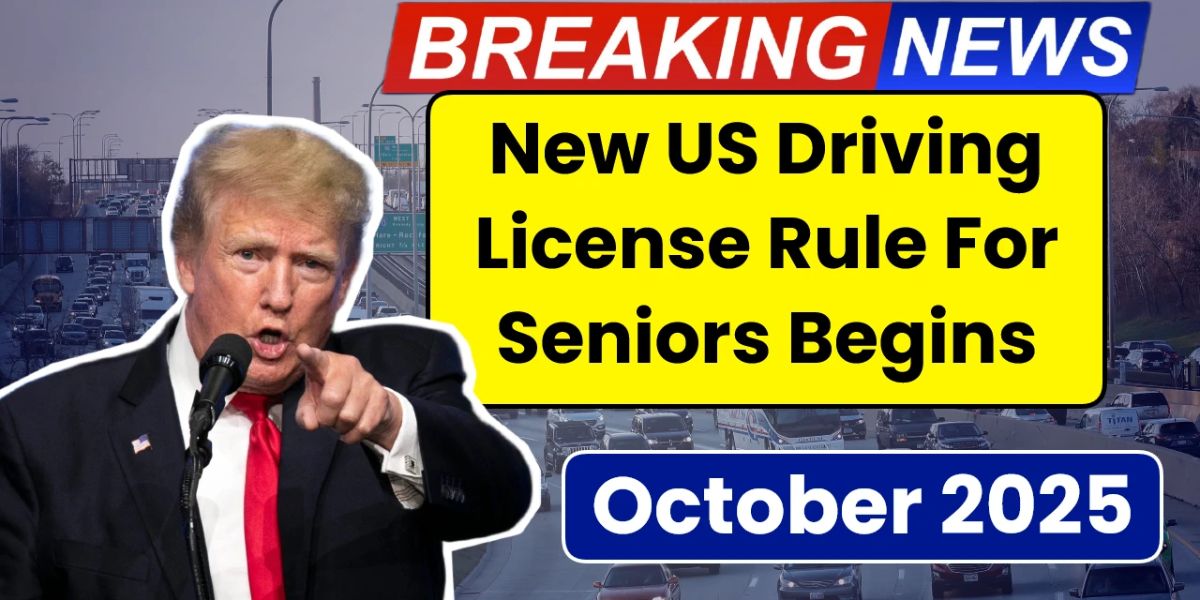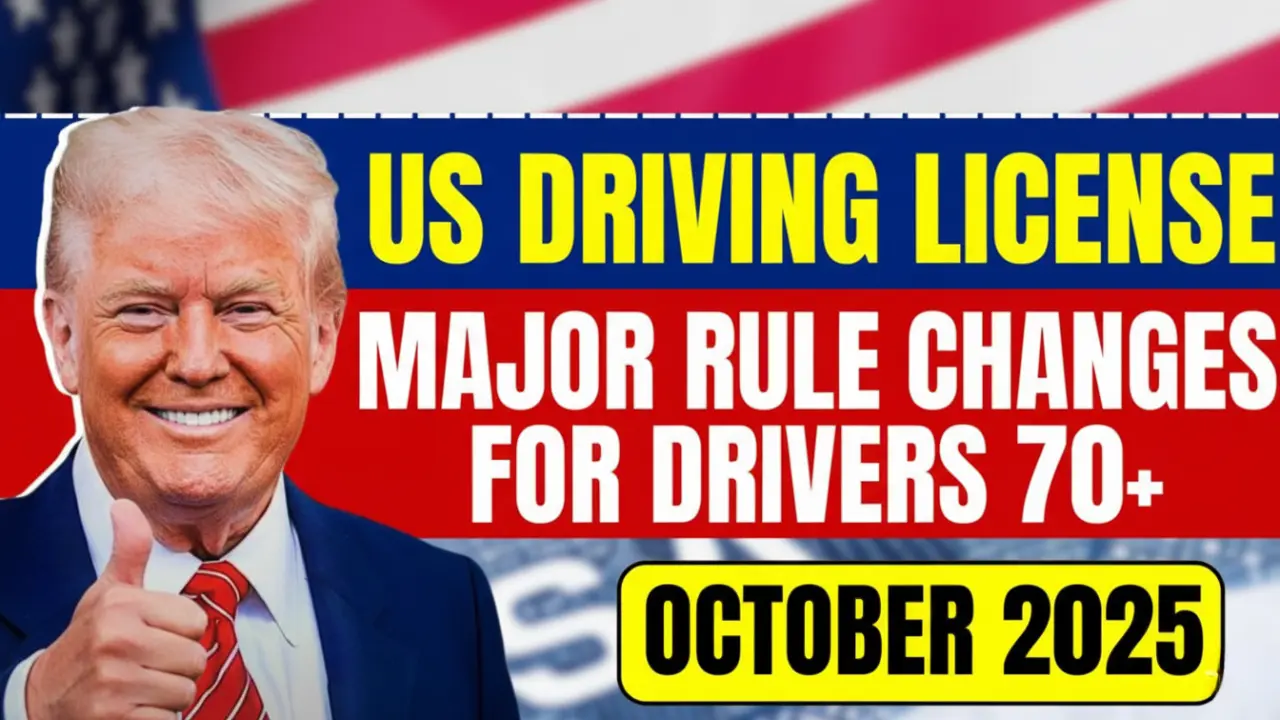As America’s population grows older, staying mobile becomes more important than ever. For seniors, driving isn’t just about getting from one place to another — it means independence, freedom, and staying connected to family, friends, and the community.
But starting in 2025 and 2026, many states across the U.S. will introduce stricter driver’s license renewal rules for people aged 70 and above. These updates are aimed at making roads safer — not taking away anyone’s independence.
Why Are States Updating Senior Driver Rules?
More than 50 million Americans aged 65+ now hold a valid driver’s license — the highest number ever recorded. While most senior drivers are safe and responsible, aging can bring changes in vision, hearing, reaction time, and mobility that may affect driving ability in certain situations.
Table of Contents
State and national transportation agencies are stressing that these new rules are not about punishing older drivers. The idea is to make sure that everyone — especially seniors — has the right tools and health checks to drive safely for as long as possible.
What’s Changing for Senior Drivers?
Every state has slightly different rules, but here are the most common changes seniors across the U.S. will start to see:
1. Shorter License Renewal Periods
Older drivers will now have to renew their licenses more often than younger drivers.
- California: Every 5 years after age 70
- Florida: Every 6 years after age 80 (down from 8)
- Illinois: Every 2 years for drivers 81–86, and every year for those 87+
This helps ensure health and vision checks are kept up to date without overwhelming the DMV system.
2. Mandatory Vision Tests at Each Renewal
Once drivers reach a certain age — usually 70 or 75 — they must pass a vision screening at every renewal.
- Most states require at least 20/40 vision
- Some allow eye exam reports from your own optometrist, so you don’t always need to go to the DMV
3. In-Person License Renewals
Several states now require at least one in-person renewal after the age of 70. This gives DMV staff a chance to:
- Confirm identity
- Check for mobility or medical concerns
- Review any red flags, such as accident history
In other years, seniors may still be allowed to renew online or by mail — if no medical issues are found.
4. Health or Cognitive Checks If Needed
If a driver reports a medical condition or if a doctor, family member, or police officer raises a concern, the DMV may ask for extra documentation, such as:
- A doctor’s note confirming driving ability
- A short reaction time or memory test, especially for people with conditions like dementia or Parkinson’s
5. Written or Driving Tests (In Special Cases)
Seniors with multiple accidents or traffic violations may be asked to:
- Take a written exam or
- Complete a behind-the-wheel driving test
But don’t worry — most seniors pass without trouble and the goal is to help, not punish.
Quick Overview of Senior Renewal Rules
| Requirement | Age It Applies | Purpose |
|---|---|---|
| Shorter Renewal Period | 70+ | Regular health and vision checks |
| Vision Test | 70+ | Detect changes in eyesight |
| In-Person Renewal | 70–75+ | Confirm fitness to drive |
| Medical/Cognitive Check | Case-by-case | Review health-related concerns |
| Driving/Written Test | After incidents | Assess driving skills |
How to Renew Your License Under the New Rules
Here’s how you can prepare for the updated renewal process:
- Check your state’s DMV website — Each state has slightly different rules
- Bring proper documents — Valid ID, proof of address, Social Security number
- Be ready for a vision test — Carry your glasses or contact lenses
- Update your photo and signature — In-person renewals require both
- Pay the fee — Usually between $25 and $50
- If needed, submit a medical form signed by your doctor or eye specialist
Tips to Stay Safe and Road-Ready After 70
The goal isn’t to take away your keys — it’s to help you drive safely for as long as possible. A few smart habits can help:
- Get regular eye and hearing tests
- Talk to your doctor about medications that may affect alertness
- Take a senior driving course (from AARP or AAA) — often gives insurance discounts
- Avoid high-stress driving times like rush hour or bad weather
- Stay physically active — Movement helps reaction time and flexibility
What People Are Saying About the Changes
Public response is mixed. Some seniors welcome the rules as common-sense safety steps, while others feel they’re being treated unfairly. But transportation experts say these changes are meant to support older drivers, not stop them from driving.
Groups like AAA say most seniors are already cautious and adjust their habits naturally. But for those in rural areas or without public transport, stricter rules can create challenges. To help, many states are also expanding senior mobility programs such as:
- Community shuttle services
- Discounted ride-shares for seniors
- Paratransit for non-drivers
These services ensure that even if someone can’t drive anymore, they can still get around safely and independently.
With Me: What It Means for Everyday Seniors
If you’re a senior driver — or have a loved one who is — these changes might seem worrying at first. But they’re really about keeping you and others safe, while helping you stay on the road longer. By preparing early and staying informed, you can renew with confidence and continue enjoying the freedom of driving — with peace of mind.
FAQ Section
1. Will all seniors over 70 need to take a driving test?
No. Most states only require vision tests and more frequent renewals. A driving test is only needed if there are safety concerns or past incidents.
2. Can seniors renew their license online after 70?
In some states, yes — if there are no health issues and you pass a vision exam. Others may require at least one in-person renewal.
3. What is the main reason for the new rules?
The main goal is to ensure that older drivers stay safe on the road by checking their vision, reaction time, and overall fitness to drive.
4. Will these rules apply in every state?
Not exactly. Each state has its own timeline and requirements, but most are moving in the same direction between 2025 and 2026.
5. What happens if I don’t pass the vision test?
You may be asked to see an eye doctor or submit a new test report. In some cases, driving restrictions like “daylight only” may be added to your license.











